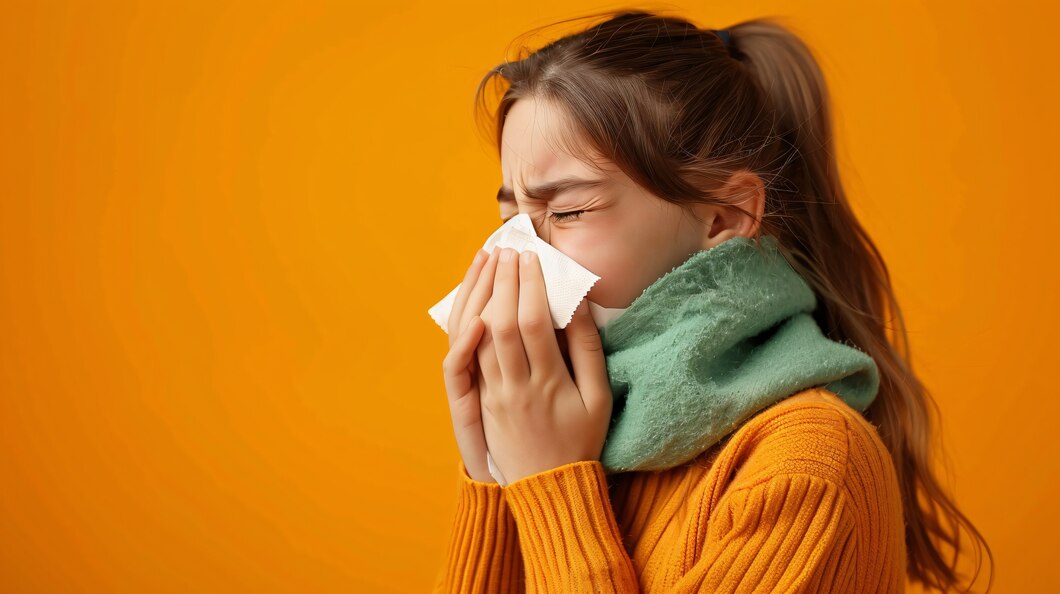Frequent Sneezing

Frequent sneezing, termed Pratishaya in Ayurveda, is often a symptom of an imbalance in the doshas, particularly aggravated Vata and Kapha. Sneezing is a natural reflex aimed at expelling irritants from the respiratory tract, but when it becomes chronic or excessive, it may indicate an underlying imbalance or disease.
-
Aggravation of Vata and Kapha Doshas: Sneezing is primarily related to an increase in Vata (which governs movement) and Kapha (which is associated with mucus and fluids). This can be triggered by:
- Sudden exposure to cold air or allergens.
- Eating foods that are cold, heavy, or mucus-forming.
- Seasonal changes, particularly during Vasant Ritu (spring) when Kapha tends to accumulate.
- Dust, pollen, or pollution.
- Improper digestion or a weak immune system (Agni).
-
Aama (Toxins): The accumulation of undigested food or toxins (aama) in the body can also trigger frequent sneezing by weakening the immune system.
-
Allergies and Sensitivities: Allergic reactions to environmental irritants, certain foods, or strong smells.
-
Nasya Therapy: Daily nasal administration of Panchagavya Nasal drops or medicated oils like Anu Taila or Shadbindu Taila helps to balance Vata and Kapha and keeps the nasal passages clear.
-
Panchakarma Therapy: For chronic cases, detoxifying treatments like Vamana (therapeutic vomiting) and Nasya (nasal administration of medicated oils) can help remove accumulated Kapha and clear the sinuses.
-
Dietary Recommendations:
- Favor warm, light, and easily digestible foods.
- Avoid cold, heavy, oily, and mucus-producing foods like dairy, cold drinks, and sweets.
- Include warming spices like ginger, black pepper, turmeric, and cumin to boost digestion and expel excess Kapha.
- Drink warm water throughout the day to balance Kapha and Vata.
-
Herbal Remedies:
- Tulsi (Holy Basil): Known for its antimicrobial and anti-allergic properties, Tulsi can help manage respiratory issues.
- Pippali (Long Pepper): Beneficial in clearing respiratory blockages and balancing Kapha.
- Haridra (Turmeric): Helps reduce inflammation and supports the immune system.
- Sitopaladi Churna: A classical Ayurvedic formulation used to treat respiratory disorders, including sneezing.
- Trikatu: A blend of black pepper, long pepper, and ginger that enhances digestion and clears respiratory passages.
-
Lifestyle Modifications:
- Avoid sudden exposure to cold and windy environments.
- Practice regular steam inhalation with herbs like eucalyptus or mint to keep nasal passages clear.
- Maintain regular sleeping and eating habits to keep Vata balanced.
-
Pranayama (Breathing Exercises):
- Nadi Shodhana (Alternate nostril breathing): Helps balance Vata and Kapha and improves respiratory health.
- Bhastrika (Bellows breathing): Clears the nasal passages and enhances lung capacity.
By addressing the root causes of frequent sneezing through a combination of dietary changes, herbal treatments, detoxification, and lifestyle adjustments, Ayurveda aims to restore balance to the doshas and improve overall respiratory health.
Give your Feedback and Reviews
Rating Breakdown
No feedback available.